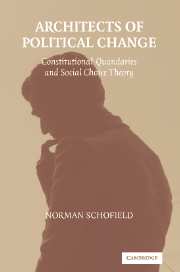Book contents
- Frontmatter
- Contents
- List of Tables and Figures
- Preface
- 1 Constitutional Quandaries and Social Choice
- 2 Power and Social Choice
- 3 Franklin and the War of Independence
- 4 Madison, Jefferson, and Condorcet
- 5 Lincoln and the Civil War
- 6 Johnson and the Critical Realignment of 1964
- 7 Keynes and the Atlantic Constitution
- 8 Preferences and Beliefs
- 9 Political Change
- Bibliography
- Index
- POLITICAL ECONOMY OF INSTITUTIONS AND DECISIONS
5 - Lincoln and the Civil War
Published online by Cambridge University Press: 23 November 2009
- Frontmatter
- Contents
- List of Tables and Figures
- Preface
- 1 Constitutional Quandaries and Social Choice
- 2 Power and Social Choice
- 3 Franklin and the War of Independence
- 4 Madison, Jefferson, and Condorcet
- 5 Lincoln and the Civil War
- 6 Johnson and the Critical Realignment of 1964
- 7 Keynes and the Atlantic Constitution
- 8 Preferences and Beliefs
- 9 Political Change
- Bibliography
- Index
- POLITICAL ECONOMY OF INSTITUTIONS AND DECISIONS
Summary
INTRODUCTION
This chapter pursues the key theoretical idea of this book: An institutional equilibrium can be destroyed or transformed by rapid belief changes in the population. The changes in electoral beliefs in the period prior to the election of Lincoln in 1860 and the commencement of the Civil War are examined in an attempt to understand the political transformation that occurred at that time, as well as its ramifications to the present day.
As observed in Chapter 2, Riker (1980) in his book, Liberalism against Populism, argued that Lincoln's success in the 1860 election was the culmination of a long progression of strategic attempts by the Whig coalition of commercial interests to defeat the “Jeffersonian–Jacksonian” Democratic coalition of agrarian populism. Riker adduced Lincoln's success to his “heresthetic” maneuver to force his competitor, Douglas, in the 1858 Illinois Senate race, to appear anti-slavery, thus splitting the Democratic Party in 1860. Riker also suggested that electoral preferences in 1860 exhibited an underlying “chaotic” preference cycle.
However, these accounts do not explain why the slavery question became paramount from 1858 to 1860. I suggest in this chapter that U.S. politics, from 1800 to the 1840s, can be interpreted in terms of a single land—capital axis that sustained the preeminence of an agrarian coalition, first created by Jefferson, of both slave interests and free labor. Lincoln's strategy from 1858 to 1860 was to persuade free labor in the northern and western states that they were threatened by the consequences of the Dred Scott decision by the Supreme Court in 1857.
- Type
- Chapter
- Information
- Architects of Political ChangeConstitutional Quandaries and Social Choice Theory, pp. 135 - 165Publisher: Cambridge University PressPrint publication year: 2006

